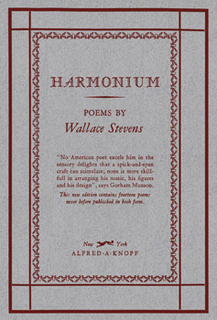Related Research Articles

Wallace Stevens was an American modernist poet. He was born in Reading, Pennsylvania, educated at Harvard and then New York Law School, and he spent most of his life working as an executive for an insurance company in Hartford, Connecticut. He won the Pulitzer Prize for Poetry for his Collected Poems in 1955.

Harmonium is a book of poetry by American poet Wallace Stevens. His first book at the age of forty-four, it was published in 1923 by Knopf in an edition of 1500 copies. This collection comprises 85 poems, ranging in length from just a few lines to several hundred. Harmonium was reissued in 1931 with three poems omitted and fourteen new poems added.
"The Ordinary Women" is a poem from Wallace Stevens's first book of poetry, Harmonium.
"Ploughing on Sunday" is a poem from Wallace Stevens's first book of poetry, Harmonium (1923). First published in 1919, it is now in the public domain.
"Cy est Pourtraicte, Madame Ste Ursule, et les Unze Mille Vierges" is a poem in Wallace Stevens's first book of poetry, Harmonium. It was first published in 1915 in the magazine Rogue, so it is in the public domain. Butell characterizes it as one of the first two poems to "successfully combine wit and elegance". They are the earliest poems to be collected later in Harmonium.
"Disillusionment of Ten O'Clock" is a poem from Wallace Stevens's first book of poetry, Harmonium. First published in 1915, it is in the public domain.
"The Doctor of Geneva" is a poem from Wallace Stevens's first book of poetry, Harmonium (1923). The poem was first published in 1921, so it is free of copyright.
"Homunculus et la Belle Etoile" is a poem from Wallace Stevens's first book of poetry, Harmonium. It was first published in 1919.
"The Comedian as the Letter C" is a poem from Wallace Stevens's first book of poetry, Harmonium (1923). It was one of the few poems first published in that collection and the last written for it. John Gould Fletcher frames the poem as expressing Stevens's view "that the artist can do nothing else but select out of life the elements to form a 'fictive' or fictitious reality."
"O Florida, Venereal Soil" is a poem from Wallace Stevens's first book of poetry, Harmonium. It was first published in the journal Dial, volume 73, July 1922, and is therefore in the public domain.
"Of the Surface of Things" is a poem from Wallace Stevens's first book of poetry, Harmonium (1923). It was first published in 1919, so it is in the public domain.
"Anecdote of the Prince of Peacocks" is a poem from Wallace Stevens's first book of poetry, Harmonium (1923). It was one of the few Harmonium poems first published in that volume, so it is still under copyright. However, it is quoted here as justified by Fair use to facilitate scholarly commentary.
"Sunday Morning" is a poem from Wallace Stevens' first book of poetry, Harmonium. Published in part in the November 1915 issue of Poetry, then in full in 1923 in Harmonium, it is now in the public domain. The first published version can be read at the Poetry web site: The literary critic Yvor Winters considered "Sunday Morning" "the greatest American poem of the twentieth century and... certainly one of the greatest contemplative poems in English".
"Depression Before Spring" is a poem from Wallace Stevens's first book of poetry, Harmonium (1923). It was first published in 1918 and is therefore in the public domain.
"Stars at Tallapoosa" is a poem from Wallace Stevens's first book of poetry, Harmonium. It was first published in 1922, so it is in the public domain.
"Bantams in Pine-Woods" is a poem from Wallace Stevens's first book of poetry, Harmonium. It was first published in 1922 in the poetry journal Dial, along with five other poems, all under the title "Revue". It is in the public domain.
"Thirteen Ways of Looking at a Blackbird" is a poem from Wallace Stevens's first book of poetry, Harmonium. The poem consists of thirteen short, separate sections, each of which mentions blackbirds in some way. Although inspired by haiku, none of the sections meets the traditional definition of haiku. It was first published in October 1917 by Alfred Kreymborg in Others: An Anthology of the New Verse and two months later in the December issue of Others: A Magazine of the New Verse.
"Colloquy with a Polish Aunt," a poem from Wallace Stevens's first book of poetry, Harmonium, was first published in 1919 and is included in The Collected Poems of Wallace Stevens (1954).
"The Man Whose Pharynx Was Bad" is a poem from Wallace Stevens's first book of poetry, Harmonium. First published in 1921, it is in the public domain in the United States.
"The Death of a Soldier" is a poem from Wallace Stevens's first book of poetry, Harmonium. The poem uses free verse to describe the death of a soldier.
References
- Bates, Milton J. Wallace Stevens: A Mythology of Self. 1985: University of California Press.
- Buttel, R. Wallace Stevens: The Making of Harmonium. 1968: Princeton University Press.
- Fuchs, Daniel. The Comic Spirit of Wallace Stevens. 1963: Duke University Press.